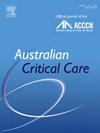Intensive care unit patients' experiences of receiving music therapy sessions during invasive procedures: A qualitative phenomenological study
IF 2.6
3区 医学
Q2 CRITICAL CARE MEDICINE
引用次数: 0
Abstract
Background
Excessive noise in intensive care units poses a significant challenge, impacting both patients and staff by elevating stress, disrupting recovery, and impeding effective communication among healthcare professionals. Despite the World Health Organization recommending noise levels below 35 dB, alarms in these units often surpass these limits, contributing to consistently high noise levels.
Objectives
The aim of this study is to explore intensive care unit patients' experiences with music therapy sessions during invasive procedures.
Methods
This study was conducted using a qualitative hermeneutic phenomenological methodology grounded in Heideggerian philosophy. Interventions were conducted with a music therapist, and 14 in-depth interviews were collected. Reflexive inductive thematic analysis was performed.
Results/Findings
From the thematic analysis extracted from the 14 personal interviews, three themes were described that represent the bulk of the experiences and emotions of the study participants following the completion of the music therapy sessions. The most noteworthy results are described in the following, organised according to each theme: (i) music therapy against noise, sounds, and light; (ii) music therapy in the face of invasive tests and techniques; and (iii) music therapy as a strategy and tool.
Conclusions
Music therapy has significant potential to enhance the quality of life for patients in the intensive care unit. Music therapy can promote relaxation, reduce stress and anxiety, alleviate pain and discomfort, and improve emotional and physical wellbeing during patients' stay and invasive procedures.
重症监护室患者在侵入性手术过程中接受音乐治疗的体验:定性现象学研究。
背景:重症监护病房中的噪音过大是一个巨大的挑战,它通过增加压力、干扰恢复和阻碍医护人员之间的有效沟通来影响患者和工作人员。尽管世界卫生组织建议噪音水平应低于 35 分贝,但重症监护室的警报声往往超过了这一限制,导致噪音水平居高不下:本研究旨在探讨重症监护病房患者在侵入性手术过程中的音乐治疗体验:本研究采用以海德格尔哲学为基础的定性诠释现象学方法。由一名音乐治疗师进行干预,并收集了 14 个深度访谈。进行了反思性归纳主题分析:从 14 个个人访谈中提取的主题分析描述了三个主题,它们代表了研究参与者在音乐治疗课程结束后的大部分经历和情感。最值得注意的结果描述如下,根据每个主题进行组织:(i) 音乐疗法对抗噪音、声音和光线;(ii) 音乐疗法面对侵入性测试和技术;(iii) 音乐疗法作为一种策略和工具:结论:音乐疗法在提高重症监护室病人的生活质量方面潜力巨大。结论:音乐疗法在提高重症监护病房患者的生活质量方面具有巨大潜力。音乐疗法可以促进患者放松、减轻压力和焦虑、缓解疼痛和不适,并改善患者在住院期间和侵入性程序中的情绪和身体状况。
本文章由计算机程序翻译,如有差异,请以英文原文为准。
求助全文
约1分钟内获得全文
求助全文
来源期刊

Australian Critical Care
NURSING-NURSING
CiteScore
4.90
自引率
9.10%
发文量
148
审稿时长
>12 weeks
期刊介绍:
Australian Critical Care is the official journal of the Australian College of Critical Care Nurses (ACCCN). It is a bi-monthly peer-reviewed journal, providing clinically relevant research, reviews and articles of interest to the critical care community. Australian Critical Care publishes peer-reviewed scholarly papers that report research findings, research-based reviews, discussion papers and commentaries which are of interest to an international readership of critical care practitioners, educators, administrators and researchers. Interprofessional articles are welcomed.
 求助内容:
求助内容: 应助结果提醒方式:
应助结果提醒方式:


